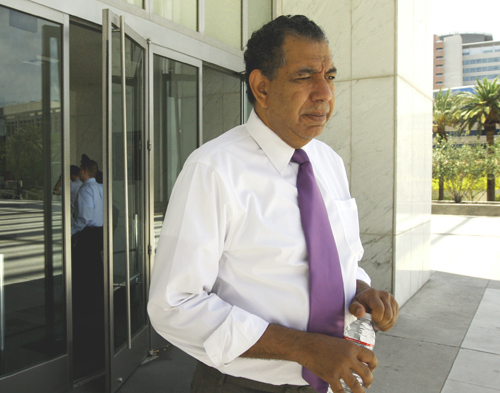Jury awards $8.8 million to anesthesiologist


In the six years since Dr. Charles Williams lost his privileges at University Medical Center, the anesthesiologist also lost his professional reputation, his family and his home.
"There was a period of time where he was homeless, living in his car, trying to preserve the documents related to this case so that he could clear his name," attorney Jacob Hafter said.
Williams, 55, received his vindication Thursday when a federal jury awarded him $8.8 million in a case against the county-run hospital and Dr. John Ellerton, its former chief of staff.
Hafter argued that UMC’s medical staff destroyed the anesthesiologist’s career when it suspended his privileges in 2005 and labeled him a drug user without any proof.
Attorney Lynn Hansen, who represented the defendants, declined to comment after the verdict was announced.
Despite the large jury award, Williams was somber as he left the Lloyd George U.S. Courthouse on Thursday.
"The damage is done, and the time is gone," he said.
In his 2009 lawsuit, Williams accused UMC and Ellerton of violating his due process rights by suspending him without giving him adequate notice of the allegations against him, including the substance abuse claims.
The suspension stemmed from complications that occurred during a kidney transplant that was performed by Dr. Gary Shen on March 5, 2005. Williams, the anesthesiologist for the surgery, was suspended two days later.
"They put all the blame on Dr. Williams," Hafter said.
The attorney claimed Ellerton and the medical staff trumped up the drug abuse allegations to protect the hospital’s transplant program.
"They threw the anesthesiologist under the bus so that no one would look at the surgical complications that occurred," Hafter said.
He said Williams presented numerous drug screens that showed no evidence of substance abuse, but "they didn’t listen to him."
Hafter said the parties reached an agreement before the trial ended that reduces the judgment to $6.5 million. The defendants agreed to pay that amount within 14 days and to forgo an appeal.
UMC also agreed to void entries in the National Practitioner Data Bank that describe Williams as a threat to the health and safety of patients.
"It really does clear his name," Hafter said. "It’s vindication for his reputation. It also sends a message to the Las Vegas medical community that you can’t destroy a physician’s career because you want to use them as a scapegoat."
Before the trial, which began May 16, U.S. District Judge Philip Pro made a finding that Ellerton and UMC’s medical staff had violated Williams’ due process rights. That left only the question of damages for the jury.
Hafter had asked jurors to award his client $24 million in compensatory damages, plus punitive damages. The jury awarded no punitive damages.
Jurors, who deliberated for about eight hours, wouldn’t comment after returning their verdict.
According to the defendants’ trial brief, Williams’ lack of insight and clinical skills "ultimately led to the end of his practice of medicine."
"No less than twenty-five independent, objective physicians, who had never met (Williams) before, told him that he had clinical and behavioral problems that needed to be addressed," the defendants’ lawyers wrote. "He refused to hear their advice. He refused to engage in any kind of self-evaluation. Every concern that was brought to his attention was blamed on someone else."
According to the document, the defendants wanted to determine why Williams, after having his privileges at UMC for five months, had "mismanaged the airways of three patients, leaving one brain damaged" and "acted unprofessionally and aggressively with his colleagues and other staff at UMC."
Hafter said the Nevada State Board of Medical Examiners investigated Williams for two years and took no action. The doctor’s Nevada license, which he obtained in 2004, remains active.
The lawyer said Williams’ insurance company forced him to settle the malpractice case related to the kidney transplant for $775,000.
When asked about the level of brain damage suffered by the patient, Hafter said, "The patient walked out of the hospital."
Hafter said Williams, who is licensed in six states, has been living with friends in Arizona.
"Right now he’s unemployed," the lawyer said. "Nobody will touch him."
Williams received his medical degree in 1982 from Howard University in Washington, D.C.
UMC has struggled with financial troubles and other controversies in recent years. Last year, the hospital lost more than $70 million, mainly because it treats a large segment of uninsured and indigent patients.
In 2008, the Centers for Medicare and Medicaid Services notified UMC that its certification for the kidney transplant program would be revoked because it had not met required patient survival outcomes. The program was recertified the following year.
Contact reporter Carri Geer Thevenot at cgeer@reviewjournal.com or 702-384-8710.












